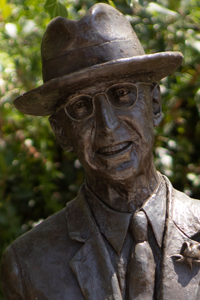-R.C. Hoiles
Critical Essay by
Dick Wallace
November 1, 1878-October 31, 1970
Energy boundless in the search for freedom of the individual
RC Hoiles was born on a farm in Alliance, Ohio, and started his career as a subscription solicitor in the local newspaper and eventually was partners with his brother Frank in The Alliance Review. Hoiles after WWI bought out Frank his brother. In the 1930's RC retired to Florida and left his oldest son Clarence to run the papers. In 1935 RC purchased the Santa Ana Register and returned to full- time work writing a daily column Better Jobs for the next 35 years
RC was constantly exploring what freedom of the individual consisted of and its importance to mankind. His probing for answers and understanding lead him to individuals such as F. A, "Baldy" Harper, F. A. Hayek, Leonard Read, Ludwig von Mises, Hans F. Sennholz , Rose Wilder Lane, Isabelle Paterson, Ayn Rand, Dr. Orval Watts, Melvin Hart and Wilford King among others.
RC believed that the Judeo-Christian religion was one of the best set of rules for the betterment of the individual and society. Because of that belief, RC spent a good deal of his time exploring those ideas with preachers and others. RC found several preachers that he believed could promote those principles better though nonpublic education because he was convinced public education didn't and couldn't teach moral principles. That belief still hold truth today.
RC never spoke of helping monetarily the start of private or church run elementary schools. I am convinced he helped finance at least two and possibly as many as eight private elementary schools in Orange County. One preacher came to RC looking for some assistance in starting a new church. After some discussion, RC felt the preacher was correct in his understanding of the Ten Commandments and challenged him to write a sermon on each of the Ten Commandments' and RC would publish each one. That was the start of Robert Schuller's Crystal Cathedral.
RC challenged beliefs of others using the rule of "close reasoning". Close reasoning is agreeing on the boundaries of a subject to be discussed and not allowing those boundaries to be crossed when the material brought into a discussion has nothing to do with the subject being discussed.
RC used close reasoning to test his understanding of his own beliefs as well as developing his debater's positions and understanding. Very few debaters would debate RC since most would not want to change their position because it would embarrass them. RC's position was, "I want my position as truthful and accurate as possible." RC would openly admit he was wrong and thank his opponent for correcting his position.
